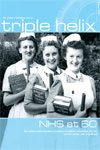Responding to disasters
Once again the world has been hit by tragedies of unimaginable proportions in Burma and China, and once again there is a cry for healthcare workers to respond to the medical consequences. Perhaps we are becoming immune to the needs that scream at us from TV, newspaper and internet. Perhaps we feel there is little we can do personally or feel we are just too busy – that our commitments or employers will not let us go. Are we overwhelmed by the thought of the bureaucracy involved? Have we given up before we started, or are we simply becoming apathetic?
It is easy to reach for our chequebooks, but far more costly to get involved practically. It is perhaps questionable whether CMF, as an organisation, should be taking direct action in such circumstances. These are matters best left in the hands of agencies with the experience and international kudos to gain entry into the countries concerned.
We would however like to hear from any members who have been involved, so that we can learn from your experience and know how best to advise others in the future. We did have a specific request from a Christian agency for help in the China earthquake and two people responded to an email soliciting help, but as it turned out, foreign nationals were not allowed visas to enter the country.
Overseas vacancies
Going to our website at www.healthserve.org
You will find an even longer list at www.oscar.org.uk - a site which is well worth a visit for all the other interesting material you will find there.
We are increasingly using the emailing facility our database provides to inform selected members of such needs. I pray that such communications won't simply be binned or deleted but will provide the necessary stimulus for a positive response.
Scaling up, saving lives
This report is the work of an international task force under the auspices of the World Health Workforce Alliance which was asked by WHO to put together a plan for educating, training, and retaining health workers overseas. Lord Crisp was its co-chair. He has been involved with Sightsavers for some 20 years and, interestingly, was originally inspired to get involved in such activities by the enthusiasm of NHS staff he had met who were spending time overseas.
This is a complex issue and remains a difficult and costly one to resolve. He suggests that national governments draw up a ten year plan, focusing on a huge increase in those with basic skills at the community level. Backed by sufficient donor money such a plan could see an end to the global health worker shortage. His enthusiasm is commendable and he is encouraged by the initiatives already being undertaken by organisations such as the RCOG and LSTM&H. The full report can be found at www.sightsavers.org.
Courses
'Doctors Reaching School' – Do you get excited about missions?
A CMF member working with YWAM says – the DRS could be for YOU! This is a new three months medical missions training course in Australia plus a three month overseas field assignment. Come and be trained in being effective and strategic in missions!
When: October 2008
Where: Perth, Australia
Prerequisite: Degree in medicine and Discipleship Training School
Info: www.ywamperth.org.au
Email: [email protected]
Book Review
Palliative Care Toolkit - Improving care from the roots up in resource-limited settings
Vicky Lavy, Charlie Bond, and Ruth Wooldridge
Help the Hospices 2008 - ISBN 978-1-871978-71-1 - Pb 96pp A4 format. CD Rom available.
Downloadable from: www.helpthehospices.org.uk and go to 'International'. For individuals based in non resource-limited settings, hard copy costs £10. Contact [email protected].
CMF News details the appointment of Vicky Lavy as the new Head of International Ministries. Vicky was involved in setting up a palliative care clinic for children in Malawi and in initiating a national palliative care training programme in that country. She has now co-authored this book.
It is a brilliantly practical, down-to-earth guide for healthcare workers in resource poor settings, demonstrating very clearly that palliative care isn't a matter of rocket science but that good basic palliative care can be delivered with limited resources by people without specialist training, involving the local community in the care provided. It is clearly set out and is written in understandable jargon-free English, enlivened by memorable quotes and African proverbs, with lots of bullet pointed lists and check boxes to drive home the important points.
Topics covered include team building; talking about difficult issues; controlling pain and other symptoms; and helping children – all in the context of a holistic approach that deals with the physical, psychological, social and spiritual problems that patients face. There is even a challenge and an encouragement in every chapter heading, eg: 'You can control pain and other symptoms; You can build a team; You can...; You can…'
A must buy for those working in resource poor settings.
































